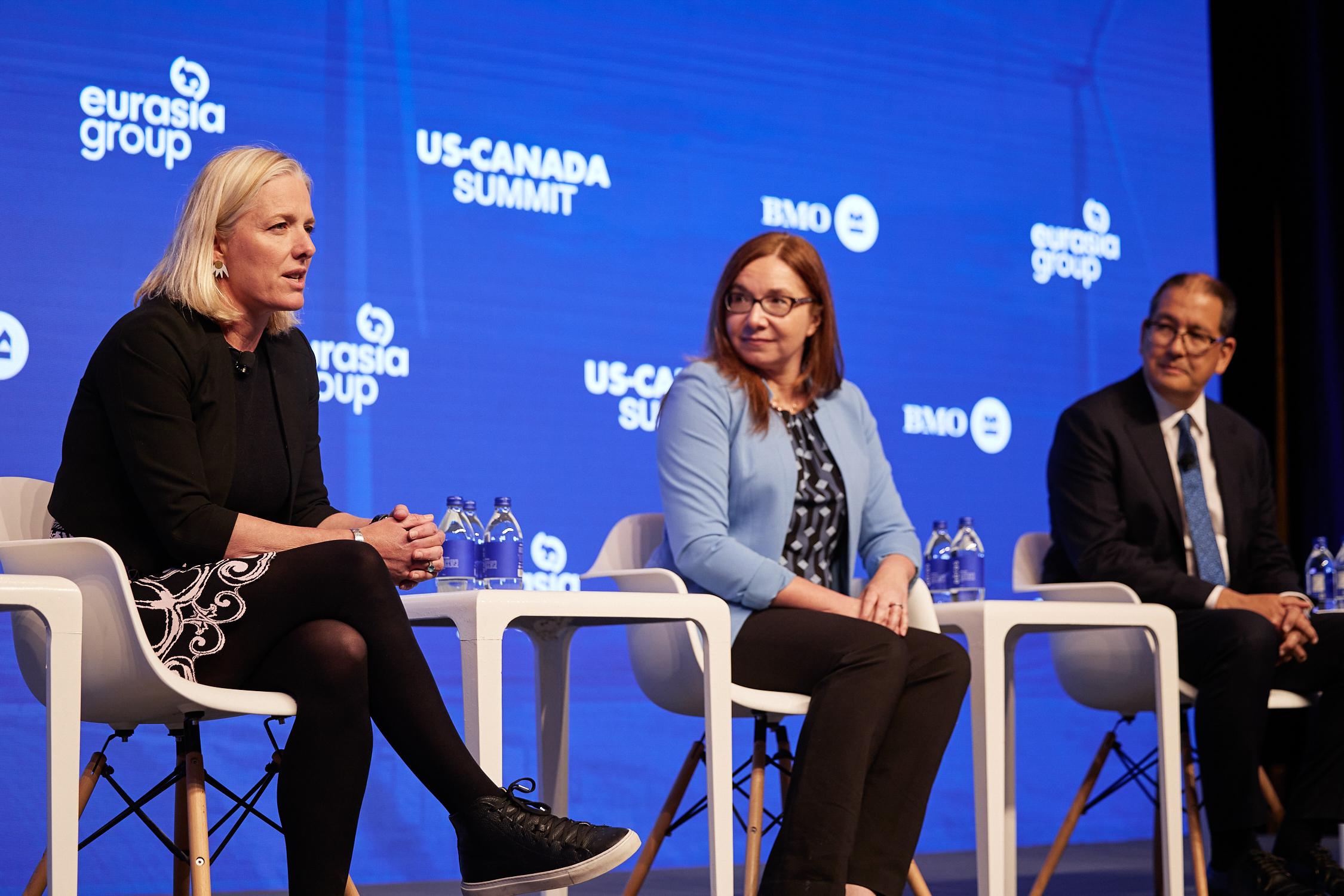As the frequency of extreme weather events continues to rise, the effects of climate change are quickly becoming less abstract, and while the race to achieve net zero carbon emissions by 2050 has always been viewed as a marathon, not a sprint, there is a growing sense that Canada and the U.S. need to move faster to mitigate the impacts of climate change.
At the inaugural US-Canada Summit, co-hosted by BMO and the Eurasia Group, a panel that brought together important Indigenous, scientific and geopolitical climate perspectives, Setting the Climate Change Agenda - From Policy to Clean Tech Investments, showed optimism for all the untapped potential to reduce greenhouse gases in North America, as well as a hint of frustration that not enough action is happening fast enough.
Moderated by Gerald Butts, Vice Chairman of Eurasia Group, the panel saw Katharine Hayhoe, Chief Scientist at The Nature Conservancy, Catherine McKenna, former Federal Minister of Environment and Climate Change, and Mark Podlasly, Chief Sustainability Officer at the First Nations Major Project Coalition, a collection of more than 130 First Nations from across the country with their own energy and mining projects, explore how climate change impacts every aspect of our lives and why it is critical to bring all voices to the table to seek solutions.
“We need to understand that climate change is an everything issue,” noted Hayhoe. “It is a human issue, it’s an equity and poverty and hunger issue, and it is without a doubt an economic issue.”
Collaboration is Key
With the climate changing faster than at any other time in human history, everyone on the panel agreed that collaboration is key to transitioning quickly to a sustainable economy and environment.
Podlasly, a member of the Nlaka’pamux Nation in British Columbia, noted the exact same conversations happening during the Summit were also happening in similar Indigenous conferences elsewhere. The issue is that despite these parallel interests, conversations and goals, neither group is in the room with the other. Throughout the day, he added, panelists spoke about how to engage Indigenous people for critical minerals, how to get Indigenous people involved in corporate ESG frameworks and the Sustainable Development Goals at the UN.
“But this conversation is happening among Indigenous people. They’re not here. You’re not there. That’s the greatest thing that’s been of impact here.”
McKenna agreed with Podlasly, adding that while she wouldn’t name each group missing, many people not in the room had valuable contributions to make that would hasten the clean energy transition.
Elite Athlete Approach
Quick action is critical to solving the climate crisis, and McKenna urged the audience to think like elite athletes, establishing more manageable incremental goals that help public and private stakeholders build momentum towards achieving the net zero emissions target by 2050.
“There’s a massive opportunity here. We could talk about the cost curves. We could talk about where the puck is going,” she said. “But to be honest, we’ve just got to get on with things, figure out how we’re going to get there and drive action.”
Part and parcel of the athlete analogy is the issue of competition. President Biden’s Inflation Reduction Act pushed the envelope on climate incentives worldwide, but Canada clearly felt the most pressure. Included in the federal government’s most recent budget were new incentives to match or keep pace with the U.S. But while Canada and the U.S. have materially different approaches to climate change – namely, using a carbon tax versus issuing green tax incentives – ultimately, both countries are trying to achieve the same reduction in greenhouse gas emissions.
As Hayhoe pointed out, we often focus on the differences between our two countries, but the reality is that we have far more in common than what divides or separates us.
Reasons for Optimism
Those commonalities, along with the fact that so many climate solutions are actually good for the planet, the people and the economy, help Hayhoe remain optimistic. “Those solutions clean up our air and our water. They make our cities healthier; they improve people’s well-being; oh, and they help with climate change,” she said.
Podlasly is inspired by the number of Indigenous organizations across North America looking to raise Indigenous issues for the benefit of capital markets. But, he noted, Indigenous people need access to affordable capital to ensure they can be co-owners of the infrastructure projects they propose.
“There’s a benefit in this and as Katharine [Hayhoe] pointed out, we will not get this done unless we do it all together,” said Podlasly.
Much like Hayhoe, McKenna is excited by the solutions that already exist to reduce carbon and methane emissions and transition to a clean energy economy. She just wants governments and corporations to move quicker to implement those solutions.
“In the end, you are leaders here, and leaders have to decide to lead. So, I implore you to look at the science, the evidence, the economic case, the national security case, and then leave and do the work.”
[INSERT BMO CLIMATE INSTITUTE LOGO HERE]
Captured in photo (L-R):
Catherine McKenna, former Federal Minister of Environment and Climate Change
Katharine Hayhoe, Chief Scientist at The Nature Conservancy
Mark Podlasly, Chief Sustainability Officer at the First Nations Major Project Coalition
